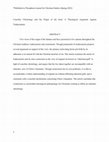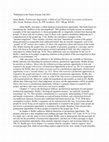Papers by Randall James Price

Perichoresis, 2023
Schellenberg and likeminded philosophers have offered a compelling argument against the existence... more Schellenberg and likeminded philosophers have offered a compelling argument against the existence of God known as the hiddenness argument. The idea that a loving God would not permit nonresistant nonbelief seems intuitive at first. Many theists have provided strong rebuttals to the hiddenness argument, attacking one or more of its controversial premises. I attempt to provide a new way forward in rebutting the hiddenness argument by challenging the assumed understanding of love that motivates many of the intuitions behind the hiddenness argument. I offer objections to the account of love that Schellenberg uncritically assumes and applies to divine-human relationships, and then go on to reconstruct the hiddenness argument with other accounts of love that are offered in contemporary philosophical literature discussion. In each case, the hiddenness argument is rendered unsuccessful. Throughout the essay, I comment on the theological merits of these various accounts of love as they are applied to divine-human relationships in order to show that, while not all of them are equally viable, Christian theists have several plausible ways of avoiding the conclusion of the hiddenness argument by adopting a different account of divine love.
Heythrop, 2023
This essay examines the doctrine of divine omnipresence. I begin by presenting three desiderata f... more This essay examines the doctrine of divine omnipresence. I begin by presenting three desiderata for an adequate account of omnipresence. Four accounts are analyzed in light of these desiderata, two in the tradition and two in contemporary philosophical theology. I argue that none succeed in providing an adequate account of divine omnipresence. As an alternative, I offer a paradoxical account of omnipresence, arguing that one can be rational in affirming that what appears to be a doctrine afflicted by apparent contradiction is in fact merely a paradox. I explain what makes affirmations of paradoxical doctrines rational, why omnipresence should be understood as a paradox, and discuss a similar account of omnipresence in the writings of Pseudo-Dionysius the Areopagite.
The Expository Times
This article presents a theological exegesis of the book of Amos. It focuses on the ethical dimen... more This article presents a theological exegesis of the book of Amos. It focuses on the ethical dimensions of the prophet's judgements of Israel and the surrounding nations. The message of Amos is set within its canonical texts, putting it in conversation with a teaching of the Pentateuch and the New Testament, especially the Epistle of James. I conclude by relating the theological and ethical elements of Amos to the concerns of the modern church.

Theophron Journal of Christian Studies, 2022
Two views of the origin of the human soul have persisted as live options throughout the Christian... more Two views of the origin of the human soul have persisted as live options throughout the Christian tradition: traducianism and creationism. Though proponents of traducianism propose several arguments in support of this view, the primary motivating factor put forth by its adherents is its natural fit with the Christian doctrine of sin. This article examines the merits of traducianism and its close connection to the view of original sin known as "inherited guilt" in light of conciliar christology, and argues that the two taken together are incompatible with an orthodox view of Christ's humanity. Though creationism has its own problems, it is able to accommodate a robust understanding of original sin without affirming inherited guilt, and is consistent with a conciliar declarations concerning Christ's humanity. The article concludes that creationism is a preferable theological anthropology for Christians wishing to affirm an orthodox christology.
Perichoresis
This article offers a Christian response to J.L. Schellenberg's argument for atheism from divine ... more This article offers a Christian response to J.L. Schellenberg's argument for atheism from divine hiddenness. Utilizing the unique theological features of the Christian tradition, I aim to show that Schellenberg's argument does not undermine belief in Christian theism. The first half of the article focuses on differences between the theological presuppositions of classical theism and those assumed in Schellenberg's use of perfect being theology. In the remainder of the article, I present a biblical theodicy that pulls from the Old Testament and current trends in religious belief to argue that the experience of divine hiddenness should not be unexpected if Christianity it true.
Book Reviews by Randall James Price
Toronto Journal of Theology
Philosophy of religion is one of the most important conversation partners for the discipline of t... more Philosophy of religion is one of the most important conversation partners for the discipline of theology. Brian Davies' An Introduction to the Philosophy of Religion provides an excellent survey of the discipline that is remarkably accessible to theologians who desire to interact with and appropriate philosophical insights.

Trinity Journal
James Beilby articulates a robust defense of postmortem opportunity. The book begins by introduci... more James Beilby articulates a robust defense of postmortem opportunity. The book begins by introducing the "problem of the unevangelized". This problem normally focuses on standard examples of the unevangelized: (1) those geographically or temporally isolated from hearing the gospel; (2) those who die in infancy; and (3) those with cognitive disabilities inhibiting one's comprehension of the gospel (pp. 3-10). Beilby also introduces examples of the "pseudoevangelized". These include: (4) those who hear "bastardized" version of the gospel being presented as inseparable from additional beliefs that are morally repugnant, such as the "gospel" of 18 th century slave traders; (5) those who experience abuse and trauma to the extent that, despite hearing the gospel, they are incapable of genuinely grasping it's message; and (6) those who hear to the gospel and progress toward responding in faith, but who's trajectory is interrupted by sudden death (pp. 10-4). These additional cases are important for the rest of Beilby's analysis, as he judges competing solutions to the problem of the unevangelized on their ability to accommodate 1-6. After surveying various solutions to the problem that have are available to Christians, Beilby launches into defending his preferred solution, postmortem opportunity. Beilby defines his position as follows: "those who die without receiving a genuine opportunity to hear and respond to the gospel will receive a Postmortem Opportunity to do so" (p. 50). It is important to recognize the Beilby does not claim everyone receives a postmortem opportunity. Postmortem opportunity is not a "second chance" (p. 152). Those who received a premortem opportunity to respond to the gospel and reject it will not be offered a postmortem opportunity. Beilby also makes no claim as to whether all, some, or none of the who receive a postmortem opportunity will respond positively. Moreover, unlike the hypothetical universalists account (p.55), Beilby affirms that, following God's final judgement, no more salvific opportunities will be available. Those who receive a postmortem opportunity will have a genuine chance to respond to the gospel, and those who reject will receive not receive another. Chapters 3-7 survey the theological, biblical, and historical arguments for and against postmortem opportunity. Beilby's theological argument assumes "an explicitly Arminian soteriology" (p. 75). This includes commitments to a synergistic understanding of God's grace and human cooperation, a libertarian account of human freedom, and a distinction between unconditional corporate election and conditional individual election (pp. 75-8). With these assumptions in place, Beilby's argument can be summarized in this way: God desires that all people be saved; being saved requires an opportunity to respond to the gospel; some people do not receive a premortem opportunity to respond to the gospel; therefore, God will provide a postmortem opportunity for those people to respond to the gospel (pp. 78-9). In chapter 4, Beilby addresses biblical objections to postmortem opportunity. The primary objection is that straightforward readings passages like Heb. 9:27, Luke 16:19-31, 2 Cor. 6:2 imply one's salvific status is fixed at death. Beilby aims to demonstrate that the passages do not rule out the possibility of postmortem opportunity, and that use of these passages to argue against postmortem opportunity often amounts improper exegesis and strawman fallacies (pp. 108-21). Beilby goes on in chapter 5 to examine what he considers "indirect support" from several passages that, while not providing explicit support for his view, render it more plausible.
Irish Theological Quarterly










Uploads
Papers by Randall James Price
Book Reviews by Randall James Price